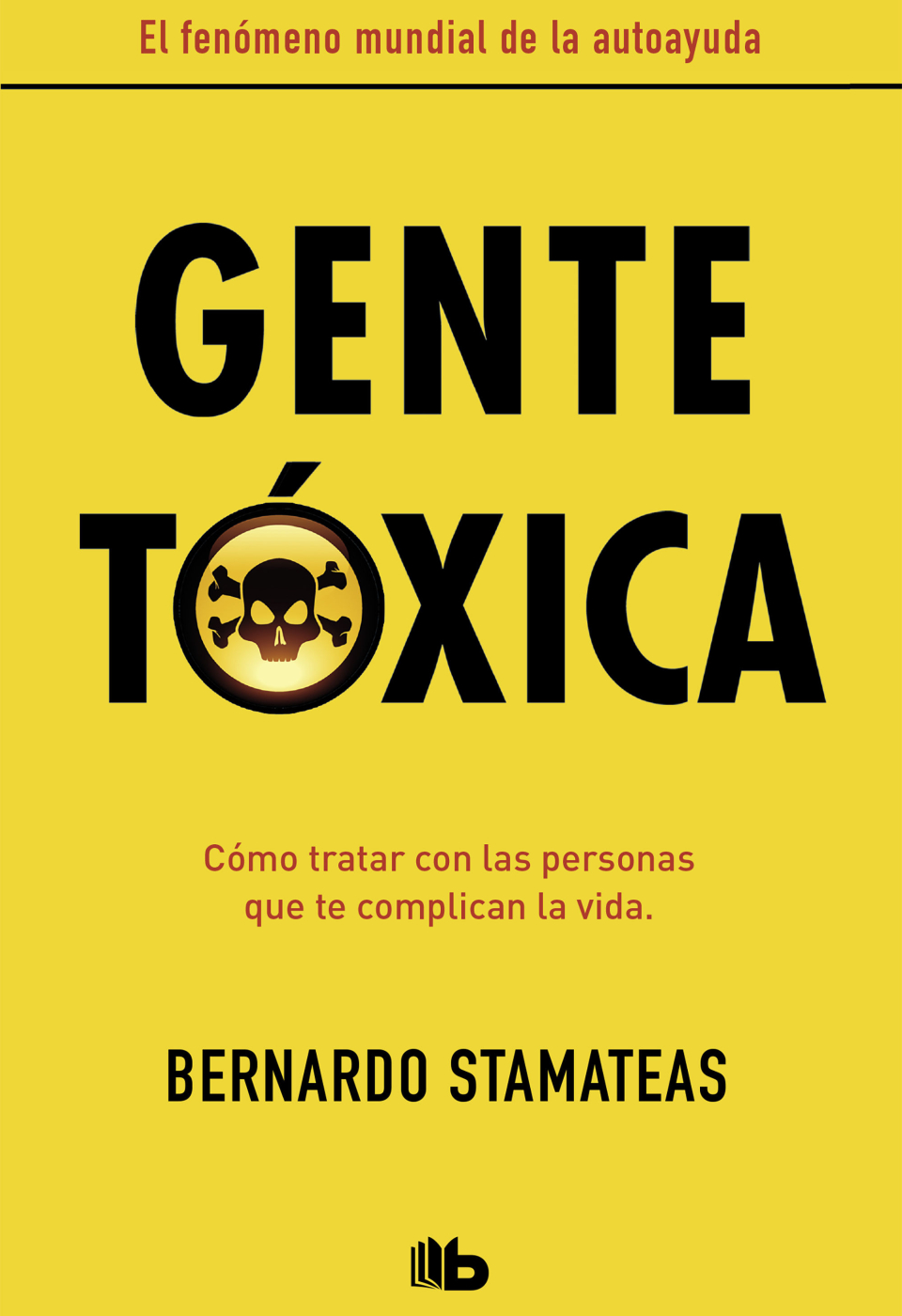Book: "Toxic People".
There are people in your life who are capable of controlling your emotions, destroying your self-esteem and even ordering your dreams; we will call these people "toxic people". These people are unconsciously affecting your life and your development, so it is of utmost importance that you learn first to identify them and then to minimize the influence they have on your mind.
This book tells us that detoxification is possible and depends entirely on each one of us.
Our mind is like a sponge, it absorbs all the elements that surround it, and no matter how strong you are, if your life is surrounded by people who feed you with negative thoughts, anger, frustration and fears, your mind becomes intoxicated and this considerably reduces your quality of life. Toxic people around you are affecting you more than you can imagine and the worst thing is that they are limiting your potential for personal development. The good news is that we can eradicate the effect these people have on us and detoxify ourselves if necessary. Each of us has the ability to control which people we want to accompany us on this journey. In the book the author teaches us how to identify, categorize and deal with these toxic people that damage our quality of life.
Generally the toxic people who hurt us the most are those who are closest to us. We are at the center of all relationships and around us are all the people in our environment who can be toxic: co-workers, partners, boss, customers, clients, friends, partners and family; anyone can be toxic, but these are potentially more likely to harm you. Take some time to define which person or people within your circle of relationships may be the ones who are intoxicating you the most.
It should be clarified that toxic people are not bad people by nature, but they are people who have been damaged in a certain way in their lives; because if a person expresses negative thoughts and comments these come from a difficult past and these types of people by unconsciousness do not know how to express that frustration and anger rather than by insults, mockery and aggression.
In this book the author categorizes the different types of toxic people that exist and identifies how these people are intoxicating your life. Realize that this compartment comes from a place of unconsciousness so we should not take it personally, empathy and compassion are the best tools you can develop psychologically to be able to have a gas mask that filters the toxins that these people radiate.
Toxic people are categorized as follows:
- the blamer: these are the people who take every opportunity to apportion blame around them for fear of taking responsibility for their actions. These people always blame others.
- the envious: this is the person who only sees his neighbor's house, his friend's car, his acquaintance's money,... These people feel uncomfortable to observe and point out themselves and because of a feeling of inferiority they prefer to observe the life of others.
- the disqualifier: these people judge and criticize because their low self-esteem forces them to put others down. Nothing is good enough and there is no concept of appreciation in their mind. You have to be careful with these people who can put you down and destroy your self-confidence.
- the verbal aggressor: this is an insecure person with many fears, their unconsciousness makes them react practically like an animal, the verbal attacks are the same as the barking of a dog that feels insecure and afraid, so have compassion for them and do not believe anything they say, as they are only venting in the best way they know how to do it.
- the fake: this person lacks self-identity, out of fear or insecurity they have not formed a sense of individuality so they will always be pretending to be someone else. If you have a strong identity these people will criticize you because you are different, weird or strange, but remember that it is their own fear that is speaking.
-The psychopath: these people were so hurt in the past that they feel no remorse about being aggressive, manipulative or treacherous. These people have lost the ability to know right from wrong, because they are unable to feel that positive emotions will guide them through a healthier life.
- the mediocre: these people are addicted to comfort in an unhealthy way. They are so afraid to get out of their bubble that they would rather lock themselves inside their own limitations than go out and pursue their dreams. These people will try to convince you to take the safe road, to hold on to what you have and to have no hope for the future.
- the gossiper: these people lack self-confidence and self-experience so they have no other topic of conversation but to point fingers at other people. Their gossip is caused by one of the following:
the first is that their life is so empty that gossip is the only way they can communicate with other people.
The second is that your relationships are so superficial that the only topic of interest is talking about other people.
- the authoritarian boss: this is the typical stereotype of the boss who has such a complicated life that he takes it out on his employees because he is in a position of authority and power. The authoritarian boss takes advantage of this to denigrate, harass and repress his employees with the excuse of achieving results. Today we have realized that this is not the way to manage a work team, the boss has to become a leader, he has to realize that the productivity of his employees is much more effective when he motivates them positively instead of inspiring fear.
- the neurotic: these people want to be in control of everything, they want things to be perfectly fine and are never satisfied with the results. These people are trapped in a world of perfectionism created by their insecurities where everyone and everything is wrong. They live in a constant state of doubt and angst so it is difficult to connect with them. They cannot be grateful for what they have because they literally do not see it, they are only able to observe what is wrong.
- the manipulator: these people are blinded by their goals, their life is so inward looking that they don't care who they have to manipulate to get what they want. These people feel great dissatisfaction in their life, they will use you when it suits them and discard you when you no longer serve them. Their vision is to use other people to continue to meet their own needs.
- the proud: these people are overwhelmed by their ego, a certain insecurity makes them cling to their vision. These people are extremely afraid of admitting their mistakes and giving the reason to someone else. These people lack an open mind that allows them to see beyond their own ignorance. They always want to be right, even if from time to time it is obvious that they are wrong.
- the complainer: these people do not know how to deal with their emotions so they repress them and expel them in the form of complaining. Complaining is the simplest way to admit that you are not where you want to be, but this form becomes annoying after a while. Although complaining is a way of venting it is very toxic and leads you down a path of regrets, regrets and doubts.
As we can see toxic people are everywhere, but there are definitely some that cause much more damage. In the end you choose what kind of people you want in your life. If you think that a toxic person is doing you a lot of harm and you can't deal with him/her in any way, there is a simple solution: think of this person as a cancer, what do you do? You take the scalpel and remove it from your body, but although the solution seems simple it is not easy, because many times those toxic people bring value in your life (sentimental value, financial value, material value,...) and you do not want to lose that value; then what you have to do is to develop a plan to generate that value without having to depend on that person and then gather the necessary courage to remove them from your life. If we look hard enough we will realize that there are a thousand different ways to get that courage without having to keep intoxicating our mind.
In short, there are two different ways to deal with toxic people:
1-Having compassion for them and not falling into their game.
If they bother you or attack you, do not get involved either emotionally, emotionally or verbally, because if you get involved it becomes a conflict to see who can do more and you will end up intoxicating yourself too.
2-See what value that person brings you and look for another way to get that same value to finally get that person out of your life completely.
In the end you have the ability to decide how infected you want to be. The cure is in our hands and we have to take the responsibility to get away from the people who are intoxicating us. We have to take a good look at ourselves in the mirror, identify which toxins can contaminate our life and the people around us. If we want to build a much fuller life we have to be much more selective with the people who accompany us. We do not have to put up with anyone. We have to become independent of the need for people, but this does not mean that we become hermits, it means that no one has to be responsible for our peace of mind but ourselves. The people around us will become a complement to our happiness and not the reason for it; that is the key to successful detoxification.
If you want to know more about our training proposal in aesthetic medicine, we encourage you to contact us. We will solve your doubts and advise you on what you need.
Dr. Manuel Rubio Sanchez
aesthetic doctor




